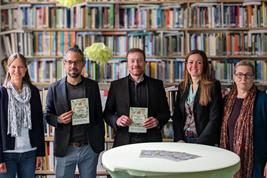08.08.2023
Press Release

Can cities rely on their surroundings for their food supply? In the case of Munich, the answer is a resounding yes. In fact, if food waste is reduced and people switch to a less meat-based and a regionalized diet, the required catchment area shrinks. This is the result of a study by a team of researchers from the Leibniz Centre for Agricultural Landscape Research (ZALF). The study was commissioned by Karl Bär, an agricultural economist and member of the German Bundestag.
Despite its high population density and mountainous landscape, southern Bavaria could theoretically produce its own food, even when adopting a fully organic production system. According to the scientists' calculations, this would be the case even if the peatlands currently used for agriculture were to be rewetted.
Regional food supply has many advantages
The vision behind the study is a regional supply of fresh food with short transport routes and the strengthening of local agriculture. "Short value chains and transport routes often have a positive economic and social impact and are usually more climate-friendly. In order to initiate political discussions and processes in this direction, we wanted to create a scientific basis with our research," says Dr. José Luis Vicente-Vicente, lead author of the study report. To this end, the ZALF team calculated the potential of a purely regional diet for Munich and the surrounding area, including the districts of Upper Bavaria, Lower Bavaria and Swabia. The so-called "foodshed modelling" takes into account local growing conditions, yields and agricultural structures as well as alternative production methods and dietary shifts, such as organic and flexitarian diets.
Reducing consumption of animal products increases self-sufficiency
Even if the areas for the economically important cultivation of hops for beer production are retained, a radius of 114 kilometers around Munich is sufficient as a catchment area for regional food supply. The radius becomes larger (125 kilometers) with purely organic farming, but smaller by up to ten kilometers if food waste can be reduced along the value chain. If Bavarians were to reduce their consumption of animal products such as meat, milk or eggs, the amount of land needed to grow animal feed would decrease and the degree of self-sufficiency would be even higher. This would also be in line with the recommendations of the Planetary Health Diet, which has calculated what a healthy diet could look like within planetary boundaries.
Funding:
The study was conducted on behalf of the Bundestag office of Karl Bär.
 Press Release as PDF
Press Release as PDF
Further information:
